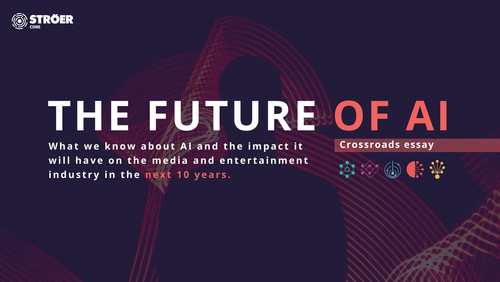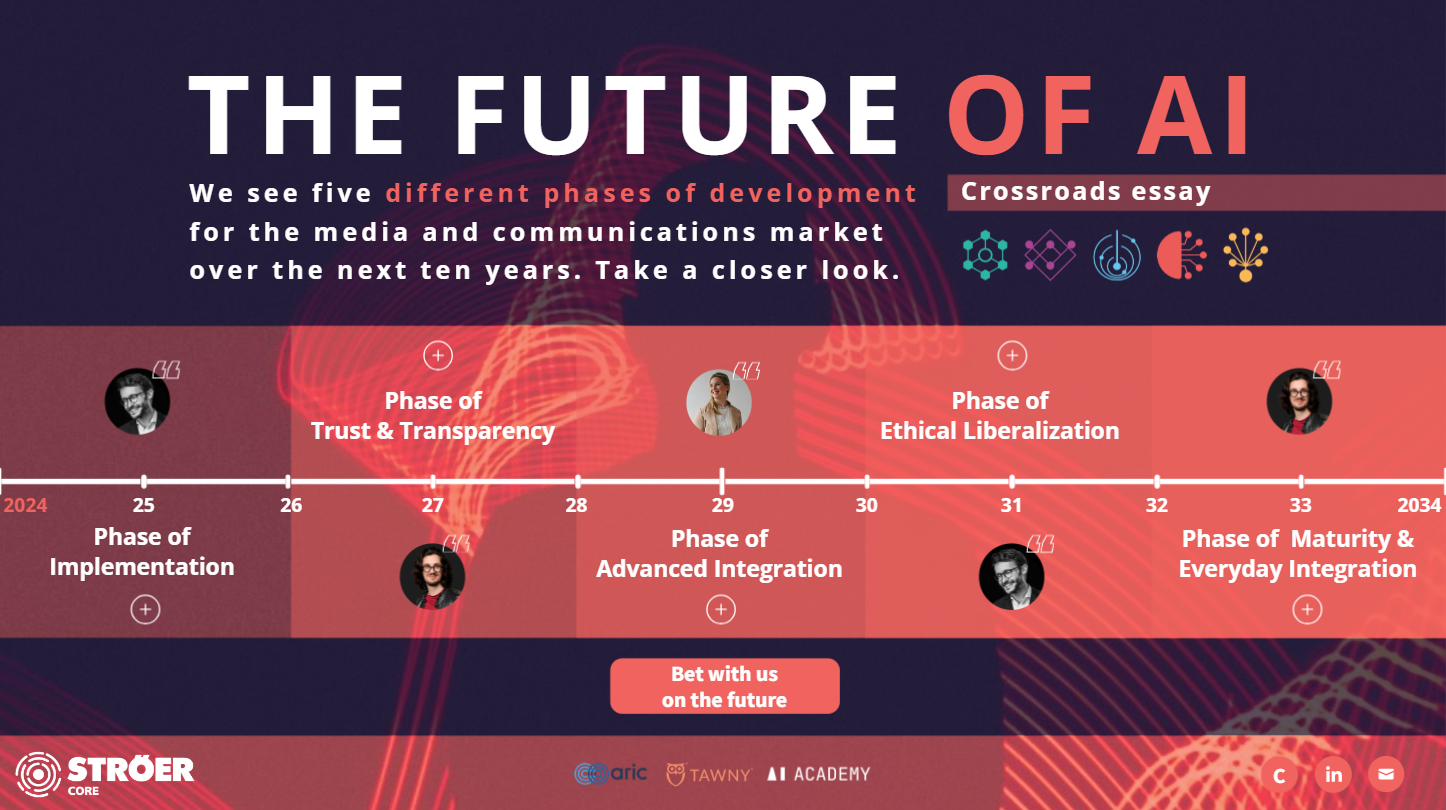
10. June 2024
Artificial Intelligence: A Journey Through the Next 10 Years
What We Know About AI and Its Impact on the German Media and Communications Market Over the Next 10 Years
If we ask ChatGPT, the chatbot that will turn two in November, for an article about the future impact of AI on the media industry, we receive a 600-character article in seconds. It describes how content production and consumption will change, predicts disruptions to underlying business models, and includes brief paragraphs on aspects such as automation, creation, personalization, data protection, and efficiency improvements. Perplexity.ai, our favorite AI search engine, which also celebrates its second anniversary in August, delivers a similar result regarding AI’s influence on the media industry in the coming years. Both forecasts anticipate extensive and profound changes.
However, the result remains generic: “automation of recurring tasks,” “new possibilities for creating personalized content,” or “placing advertising messages more targeted and effectively” can be interpreted flexibly and used only as inspiration for one's initiatives. There is no doubt that AI will change our world, including media and communication. We believe these changes will go beyond generically generated responses. What specific changes are coming? What events can we not foresee yet? What bets do we want to place on the next ten years?
All together – not now but soon
AI's power doesn’t come solely from itself. It is a foundational technology, as all AI enthusiasts tirelessly mention. We believe in the power of innovations and change, reflected in the continuous development and success of our company. Possibly, with Artificial Intelligence, we will have created the first synthetic species on this planet in the near future. No, we didn’t make that up; these are the words of Mustafa Suleyman, none other than the CEO of Microsoft AI and co-author of the book “The Coming Wave,” which he stated at a TED conference in Vancouver this April. This initially crazy-sounding thought makes one thing clear: AI cannot be viewed in isolation. A new species, whose (data) foundation is the entire human history and its achievements, as the culmination of all technological evolutions, can naturally integrate into the environment from which it originated. The most significant changes, leaps, and creation of new things will occur by combining AI with other technologies, such as robotics.
But which fields are particularly relevant for the media industry? Which will have the greatest impact on our current working lives? What shifts, transformations, and new things will emerge?
It’s all about timing
In 2017, Google laid the foundation for today's neural network architectures and transformers with their paper “Attention is all you need.” In 2022, OpenAI released ChatGPT, creating the first opportunity to have a naturally sounding chat with a machine. There may be debates over which of these events led to the sustained rise of AI. We are sure this rise is unstoppable. The rapid developments in the AI field caught up with the last people in 2022, and since then, one leap in generative AI has followed the next: natural speech output was followed by image generation, and by now, systems have developed remarkable capabilities for generating videos, music, or even voice generation.
How can companies ensure they don’t lose track or oversight?
To answer the preceding questions, we opted for the traditional path: hard work. We subscribed to newsletters, read studies, attended conferences, and spoke with experts.
For the German media and communications market, we have taken a deeper look at three fields:
- Generative AI
- Conversational AI
- Emotion AI
We have aggregated this knowledge and invite you to discover it in the interactive Crossroads Essay “The Future of AI,” to bet on the future with us, and to engage in exchange. Additionally, there is a chance to win something. Here you can access our essay.
For the best user experience, we recommend using the desktop version.
Media content in this blog post was created with the help of AI.
We use the “genially.com” tool from Genially Web, S.L. (hereinafter referred to as Genially) to provide you with access to the content of our essay faster and in an optimized format.
When using the tool, a connection to the Genially servers is established.
Please refrain from entering personal or company-related data when entering your requests via the input field.
Further information about Genially and our privacy policy can be found under the following links:
https://www.stroeer.de/datenschutz
https://genially.com/de/datenschutz/




